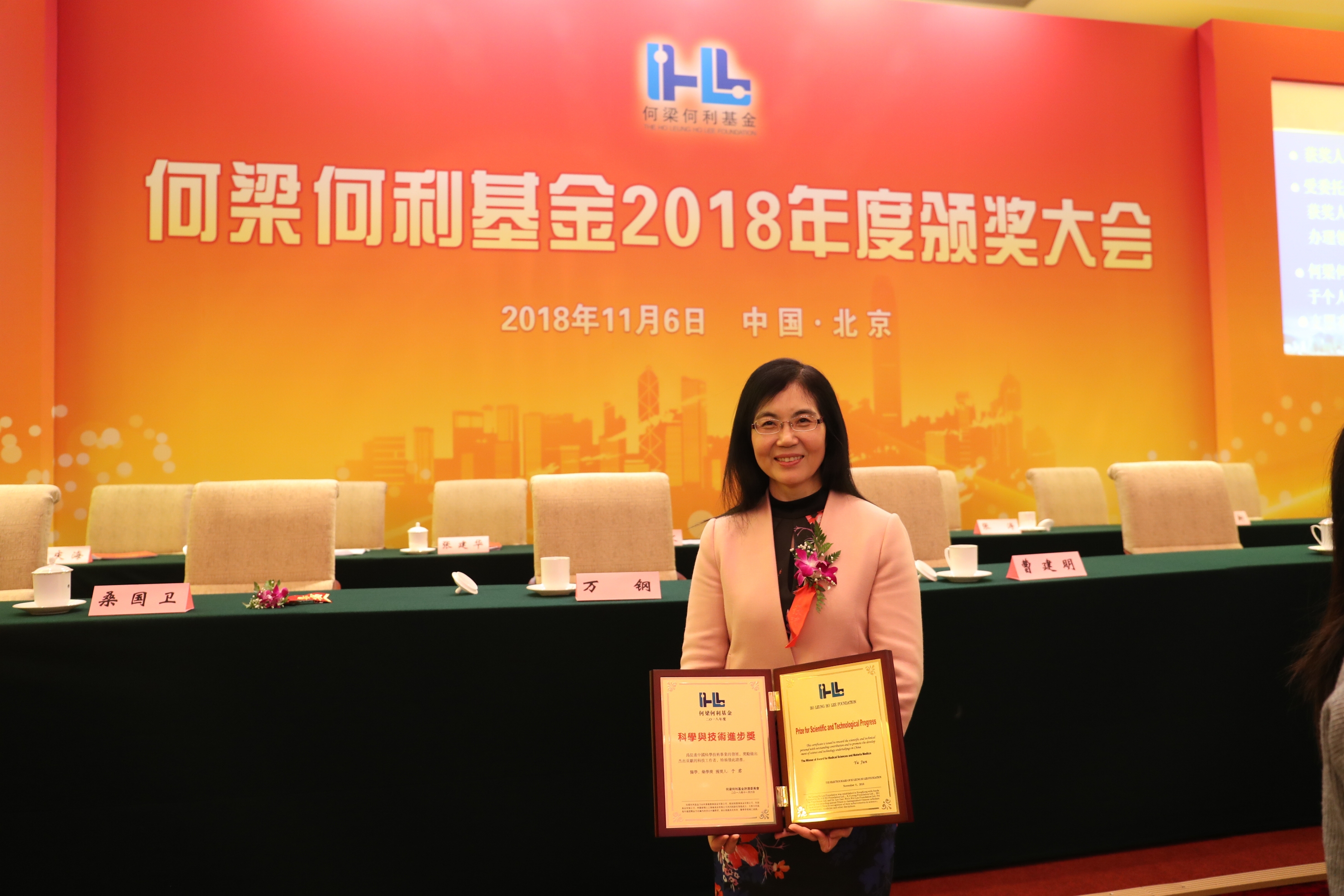CUHK
News Centre
Professor Yu Jun Honoured with The Ho Leung Ho Lee Foundation Prize for Progress in Science and Technology
Professor Yu Jun from the Department of Medicine & Therapeutics, Faculty of Medicine at The Chinese University of Hong Kong (CUHK) has recently received the 2018 Scientific and Technological Progress Prize (Medicine) presented by Ho Leung Ho Lee Foundation, which was given for her substantial medical discoveries, as well as contributions to the Chinese scientific and innovative community in recent years. Her researches have far-reaching implications for understanding the pathogenesis, diagnosis, treatment and prevention of lesions in digestive system and liver.
Professor Yu expressed her profound gratitude saying, “The Ho Leung Ho Lee Foundation Prize is a major award in the Chinese scientific community. I am honoured to receive this distinction and it recognises our team’s research efforts over the past years. We will continue to seek scientific advancement and to conduct more researches of high quality in order to transform research results into clinical applications and, most importantly, to improve medical standards and provide patients with better treatment.”
The Ho Leung Ho Lee Foundation was established in 1994, with donations from the charitable foundations of Dr. Ho Sin Hang, Dr. Leung Kau-Kui, Dr. Ho Tim, and Dr. Lee Quo-wei’s Wei Lun Foundation Limited. It is a technology award established with the aims of rewarding outstanding and innovative Chinese academics and promoting science and technology development in the country. The annual award ceremony was held yesterday (6 November) at Diaoyutai State Guesthouse in Beijing, with over 30 top scholars (7 in Medicine) receiving an award.
Professor Yu’s work in digestive system and liver oncogene recognised by International and Domestic Awards
Colorectal, stomach and liver are the most common types of cancer among Chinese people and account for 40% of cancer cases in Hong Kong. Since joining the Department of Medicine & Therapeutics, Faculty of Medicine at CUHK in 2005, Professor Yu has been dedicated to research in digestive system and liver lesions and tumor formation mechanism, and discovering accurate and effective ways of detection, prevention and treatment.
Professor Yu, who is also the Director of the CUHK Research Laboratory of Institute of Digestive Disease and Associate Director of the State Key Laboratory of Digestive Disease, has published a number of substantial researches. These include discovering over 30 new genes that suppress stomach cancer and identifying novel biomarkers for non-invasive diagnosis, revealing for the first time the genomic and epigenomic alterations in EBV-associated stomach cancer by integrated genome sequencing, unveiling the mutational landscape of colorectal cancer in the Chinese population, discovering new fusion genes and high-frequency mutated genes, and inventing non-invasive diagnosis through blood and feces testing. Furthermore, Professor Yu has recently discovered an essential oncogene in Non-Alcoholic Fatty Liver Disease-associated Hepatocellular Carcinoma (NAFLD-HCC) and has identified an inhibitor, Terbinafine, which effectively suppresses cell proliferation in NAFLD-HCC cell lines and Hepatocellular Carcinoma formation. This has provided new directions for the prevention and treatment of this disease.
Professor Yu’s contributions to the advancement of medical science have been recognised by many prestigious awards such as the Research Excellence Award CUHK 2010, three first-class awards of the Higher Education Outstanding Scientific Research Output Award from the Ministry of Education, three project/team awards of the State Science and Technology Award, the Croucher Senior Research Fellowship 2016, and the American Gastroenterology Association Council Gastrointestinal Oncology Section Research Mentor Award 2017. Professor Yu has published over 370 publications in international peer-reviewed journals. She is now the deputy editor of Oncogene, and editorial board member of internationally renowned journals such as Gut, SciRep and JGH.



